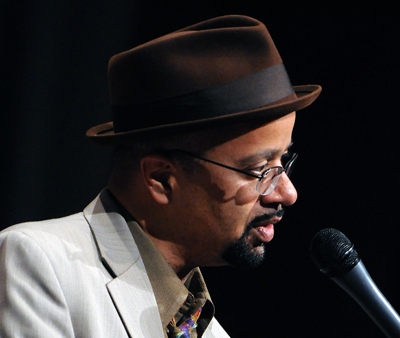Thursday, Dec 3, 2009
As the author of The Color of Water – a landmark account of his search for racial identity – James McBride could have been content simply to discuss his 1997 classic, as well as his other critically acclaimed novels, Miracle at St. Anna or the more recent Song Yet Sung.
But McBride had more to say to his audience at the 10th Annual Distinguished Writers Series, presented by the Equal Opportunity Program (EOP) at Rider University, than a rote series of answers about his collective works. Rather, McBride seized the opportunity to offer students his perspective on what he figures to be the most compelling components of college life.
“College is a journey of discovery,” McBride exclaimed. “Learning who you are is the joy of the journey.”
McBride’s talk was preceded by an introduction by junior English major Rance Robeson, creator and editor-in-chief of Rider-based On Fire!!, a literary journal of the African Diaspora. “James McBride is my kind of ‘bad.’ He’s not bad because he comes from the same type of mean streets as I come from,” said Robeson, a native of the tough Bedford-Stuyvesant neighborhood of Brooklyn, N.Y. “He’s bad because he wasn’t afraid. He wasn’t afraid to write the pain down or blow it through his saxophone.”
While Roberson spoke glowingly of McBride, the link between the two is not distant. Director Spike Lee’s film version of McBride’s Miracle at St. Anna featured actor Ezra Mabengeza, whose photographic work graced the cover of the second issue of On Fire!!
McBride took the stage of the Bart Luedeke Center Theater, somewhat overwhelmed by Robeson’s emotional introduction. “Wow! I’ve been to a lot of schools, and I’ve never had an introduction like that,” he said.
Encouraging the students in the audience to get the most they can out of their years on campus, McBride said that self-discovery has much to do with trial and error.
“You’ve already shown you know how to succeed – you’re here at Rider – but now that you’re here, you’ve got to learn how to fail,” he said. “You may have read the books I’ve had that were successful, but most of what I do fails. Learn to forgive yourself for your failures. Nobody can be you better than you, so don’t look back and dwell on what failed. Just press ahead.”
McBride said that not only is college the ideal time to learn about yourself, but it also presents the opportunity to find out about others from different backgrounds and interests.
“Study what you like, but make sure you don’t leave here until you’ve studied English, anthropology, psychology, history and many other subjects,” he explained. “You want to be a person who thinks, and those subjects will teach you to do that.
Also, be wary of prejudice – it’s a great evil,” McBride continued. “If you allow it into your life, you will suffer. In this world, if you can’t work with people who are different than you, the likelihood of you ever being successful is lessened greatly.”
At the same time, however, McBride cautioned against wasting too much time on the politics of racial division. “If I were here, I’d be a lot more concerned with studying about Edgar Allan Poe or E.E. Cummings than about N-words or anything like that,” he said. “Visit an old-folks’ home, and talk to them, and you’ll see they’re not worrying about black or white or money. It doesn’t matter anymore to them, because they value people.”
Success, as McBride defines it, is not so much about accumulating wealth as it is living with integrity and honesty. “If you’re truthful with yourself, you’ll do well,” said McBride, who, as a saxophonist, also tours with his six-piece jazz/R&B band, and has served as a sideman with jazz legend Jimmy Scott among others. “Music is about the truth, and if you want to play, you have to honor it.”
In addition to authoring several books, McBride is a former staff writer for The Boston Globe, People magazine and The Washington Post. His work has appeared in Essence, Rolling Stone and The New York Times. His April 2007 National Geographic story entitled “Hip Hop Planet” is considered a respected treatise on African-American music and culture.
Past guests of the EOP Distinguished Writers Series at Rider have included Pulitzer Prize-winner Junot Diaz, Pulitzer Prize-nominee Ernest Gaines, 1992 Nobel Prize winner in Literature Derek Walcott, American Book Award-winner Edwidge Danticat and former state poet laureate Amiri Baraka.

